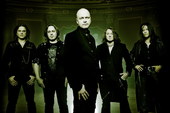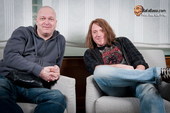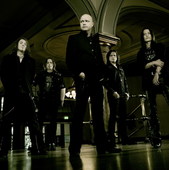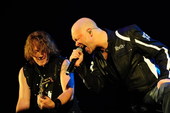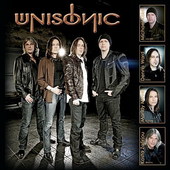Unisonic
I Don’t Look For People’s Opinions
26.02.2012
Àðõèâ èíòåðâüþ | Ðóññêàÿ âåðñèÿSometimes you don’t have to leave to come back. Michael Kiske has always been around – he was releasing solo albums, participating in various metal operas, doing guest appearances here and there. But it would not be an overstatement to say that most of the people who were at any point in time fascinated by Helloween’s “Keepers” and their other works with Michael have been wishing to hear him again in a heavy metal band environment. The hour has come, and Unisonic is this band. Working alongside with Michael are Dennis Ward (bass) and Kosta Zaforiou (drums) – ironically, they are the rhythm section of Pink Cream 69, whose singer Andi Deris replaced Kiske in Helloween. Also in the band are Mandy Meyer (ex-Gotthard, ex-Krokus) on guitar and none other than Kai Hansen himself on the second guitar. Unfortunately for old Helloween fans, the first Unisonic record does not sound like “Keepers” too much, but it still may very well be the best album in years in which Kiske has been involved as a songwriter. An intriguing and unexpected - yet much dreamed of – development that naturally needs comments by the man himself…
Before Unisonic you had the band Place Vendome with nearly the same line-up. Why did you decide to start a new band with mostly the same people? When Unisonic started, your live sets mostly consisted of Place Vendome material anyway…
Place Vendome wasn’t really a band, that was some sort of project that was brought together by Frontiers Records. It was with Dennis on bass and Kosta on drums, that’s true, but Unisonic is a different band, it’s a different situation. It’s just that the three of us are also in that band, but we have full control creatively here, which we did not have in Place Vendome.
Do I understand it right that the name Place Vendome actually belongs to Frontiers Records, not the musicians?
Yeah, Serafino (Perugino, Frontiers Records president) brought it up, he does projects like that. He wanted an AOR record with me and vocals, that’s how he approached me. He e-mailed me if I would be interested in singing AOR songs, and I thought that would be an interesting thing to do. That’s how it came to life. Yeah, it’s actually his project.
You said about Unisonic in an earlier interview, “Not only are our musical tastes very different, but we fully function in different ways”. What is so different among the members of Unisonic?
Yeah, we’re totally different people. It’s not always easy, but on the other hand it’s also very interesting as long as we get it together. One guy that would do things in a way that I would probably not even think about, and vice versa. That can work pretty well and bring interesting stuff to life.
How do you manage to overcome those differences? Do you argue, do you sit together and work things out?
You don’t have to bring them together. When everybody adds what he has in mind, then we see how much the rest can follow it. You just say what you think and then you see if the others can follow that. Whatever most people agree with, gets done.
How did the addition of Kai Hansen change the songs on the first album?
Very very much. I think that Kai was pretty much the last element that was missing. We originally had the plan to release the first Unisonic record somewhere in the beginning of 2010. As you can see, it didn’t happen. We had lots of material, but we were never completely satisfied. Since I got in touch with Kai again via the Avantasia shows that we did, we started to discuss doing something together again. Kai later on had this idea of joining Unisonic, and from that moment on I knew what had been really missing. Not only Kai came up with lots of songs of his own that we later on developed together as a band, but he also was working on tracks that we already had. “Star Rider” is a good example. When we had “Star Rider” in the beginning, Dennis wrote the groove and he had the verses, all that stuff was there and it was working. Then he had the chorus which was not totally convincing, and when Kai heard that track, he said, “I don’t like that chorus! What if we do that…?” And very quickly he wrote the chorus as it is now. That works perfectly together. That’s what really makes a good band to me. Kai was really the missing link, now everything works. Kai and Dennis have very nice dynamics, me and Kai have very nice dynamics, Kai and Mandy have very nice dynamics, and you need that. As soon as he was in the band, things very quickly fell into place. We only worked for about two weeks on old material, and the record was pretty much finished.
Is it OK for you that Unisonic is primarily marketed as “the reunion of Kai Hansen and Michael Kiske”?
Well, record labels always do that, I don’t really care. We started Unisonic as a new rock band, and how Kai is a part of it – of course, they use it. That’s what it is – it is a band of its own, but it’s also the reunion of me and Kai. I don’t like when labels do this kind of things, when they always mention Helloween with everything that I’m doing, but on the other hand, I understand why they do it. They always think that they can get some extra attention or whatever, and you gotta learn to live with it as a musician.
I remember interviewing Piet Sielck of Iron Savior a few years ago, and he said that Iron Savior was limited in many ways, because it depended on the schedule of Kai Hansen. Aren’t you afraid that Kai’s involvement in Gamma Ray will be a restriction for Unisonic?
It will be, and vice versa. We planned to do it in a way that one year Kai will have primarily Gamma Ray in his head, and the next year he will have primarily Unisonic in his head. It doesn’t mean that on a Gamma Ray year there will be no activities for Unisonic, but it will be mainly Gamma Ray. That way Kai will have time to do both bands. And I don’t mind having years with fewer things to do, maybe I will do other things in between. That’s the plan we have for now.
Are you going to continue your solo career?
There will be at least one more record. I don’t know if I do another one after that, probably not for a long time, but I still have one contract to fulfill, so I will be doing one this year.
With Unisonic, you started performing live again after 17 years of absence from the scene. But why weren’t you playing gigs with your solo material?
I wasn’t ready for live. I did have some very nice offers. I remember when I released “Past In Different Ways” (2008), I had some nice offers for some acoustic shows, just with acoustic instruments, which would have probably been a very nice thing to do, but I wasn’t ready for it. I didn’t feel like going onstage. I did it very slowly with Unisonic. The first official gigs we did with Unisonic in 2010 were quite big things - we played Sweden Rock, there were 30,000 people, then we played Masters of Rock in the Czech Republic, but before that we did three very small club gigs, just for getting a feel for live again. Of course, there was a lot of press there, but that was basically for warming up. Luckily I was getting into it very quickly. I didn’t know what to expect, but now, especially after the Avantasia shows we did, I feel very comfortable on stage again. I have my security back.
Have you considered performing any of your solo material with Unisonic? Something like “New Horizons” would be great – and you wrote it together with Kai anyway…
No, not really. We wanna mainly do the Unisonic stuff, and if we add some extra songs to it, because we don’t have enough stuff, it will probably rather be classics from my and Kai’s years with Helloween. It’s fun to do, fans love it, and we have to use this opportunity - now that Kai and I are in a band together, it would be silly if we don’t play a couple of songs from those days.
You made quite a few comments in the late 90s criticizing the metal scene. In your opinion, how much is the situation on the current metal scene is different from what we had in the 90s?
I don’t think it is much different. I will never agree with the part of that scene where Satanism goes on, and all this idealizing of inhumanity and evil. I’m not a fascist, and these ideals are pretty much the same ideals that fascists had, just under a different flag. If you think that being heartless and brutal gives you some form of strength, you are on a strange fascist path. Being heartless just means that you have no heart or a weak heart, it doesn’t give you any strength. I totally disagree with that side. There was a phase when I was totally pissed about it all, I didn’t want to have much to do with that, and I didn’t have much to do with that, I was just doing my solo records and in the meantime I was doing other things, studying philosophy, etc. I dealt with a lot of scientific and spiritual things that I was interested in, I was pretty radical for a while, I was trying to be consistent in what I’m doing. But since I got in touch with audiences again through the shows that we did with Unisonic, for instance, I didn’t know what to expect. I was quite under pressure when we did those shows, but they went off really well. After our performance at Sweden Rock we did a signing session, and there were lines of fans, and they were all just sweet and excited – and I noticed that there was a beautiful side about it. I was kind of going a bit extreme for a while, it wasn’t a very long time, just one or two years, when I didn’t wanna have anything to do with anything guitar-oriented, but that was just a very short period. I have always liked rock music, during most of those years I could still enjoy some of the older Iron Maiden or Judas Priest records I grew up with, but there is a certain spirit in the metal scene that I just can’t cope with. But that’s not all of it, there’s also a beautiful side of it, and that side’s OK. I have made my peace with it, because I have met fans again. I wasn’t in touch with the scene for almost 17 years. Sometimes you get a wrong picture.
You also criticized the metal scene for being too narrow-minded and refusing to accept changes in music. I remember how in the early 90s people would tell me, “Oh, how can you listen to both heavy metal and Depeche Mode? You’re so weird…”
I was never like that, I was always very open-minded musically, and I still am. I don’t see any benefit in listening to just one sort of music. I don’t know why people make political phrases out of their musical tastes, everybody should listen to the music he likes. But honest music regardless of its style, if that’s what you really believe in and you express yourself in it – that’s true art. It doesn’t matter what type of music it is. I grew up with various types of music, even in my hardest metal days I was also listening to other stuff, and this will never change. I was quite disappointed, especially in the 1990s, because I discovered that the metal scene is very little about free music, it has really the same attitude towards creativity as you have in other music scenes, like the pop scene. It always brags about bands being real, but how real is it, if I can’t make a record that I believe in, even if it sounds different to something I’ve done before? Why should I reproduce successful records, what’s true about it, if I do the same thing again just because a certain audience wants to hear the same stuff? That was kind of disappointing for me –the ideals that many have in the metal scene, they don’t really live them. They talk about them, they like to paint them on their flags, but they don’t really live for them. I can understand it from a fan point of view to a certain extent, but I cannot understand it from a journalist point of view. Journalists should have a bit more of understanding of musical culture.
But don’t you think that much of it has changed now? Nowadays I’m criticized for NOT listening to drum’n’bass or post rock, nowadays you will be labeled a dumb metalhead if your musical tastes are not wide enough…
I don’t know. Tell me, is it?
I think it is. Now people criticize me for being “too metal”, which is not quite the case, even though it is true that I don’t listen to drum’n’bass…
You have this type of people everywhere. It’s just a certain mentality – when people like a certain soccer team, they hate the other soccer teams. I don’t know why people need to identify themselves to whatever it is – soccer team or musical direction – and that makes them fight the other ones. I don’t know why, but it’s a common thing, many people do that.
Apart from being a musician, you have also written a book and some essays. Unfortunately for me, almost all your works are in German, so I don’t know too much about the content of them, I’ve only managed to found one essay in English. Can you say a few words about them?
That was just a very short one that I did because of certain questions that I had been asked. As I said, over those 17 years – or actually longer than that – I started to get interested in lots of these philosophical, religions, spiritual questions of life. When I was about 21, that’s when I started to get really interested in that. From that time on, I was constantly studying those things, and my essays in the end are pretty much the result of it. They deal with music, religions, spirituality, scientific and philosophical questions. It depends on what it is. They’re very idealistic, and they’re the result of more than 20 years of working, researching, trying to learn and understand some things. They’re not very easy to be translated into English, that’s why I wrote a little English one, but of course, it doesn’t contain everything that I have written. Maybe one day they will be translated into English, it’s a good thing to do because not so many people speak German, of course.
Usually people publish their essays or other works online when they want to get some kind of reaction from the readers. But your philosophical website (www.geisteskind.de) does not event contain a guestbook. Aren’t you interested in hearing people’s opinion about your works?
To a limited extent. I like people and I respect their opinions, but certain things… I was just expressing my convictions basically, not so much putting them on a table for discussion. I do that at interviews – when people ask me questions, I explain something, but these essays are basically just statements of mine, the best thing that they can do is motivate people to research, to search for themselves and try to find some answers. I don’t really care that much whether anyone agrees with that or not, it’s just my opinion, and everybody is free to have their own. Discussions are interesting and fruitful about certain issues, but not about everything. When it comes to certain human ideals, it can be interesting, but I wasn’t even thinking about a guestbook. I get reactions anyway, usually I get reactions via e-mail, in letters that I get, I do have some sort of feedback, but I’m not so much about having discussions about it. At least not by the time when I wrote those essays.
One thing that I don’t like too much about the current metal scene is that it’s too interactive. Whenever a musician puts something out, there are always people who write on his web resources that this is crap. Then the musician comes back and says, “You guys are idiots”, and the circle starts anew…
(laughs) I was always trying to keep out of this. I don’t read reviews, and when I do an interview, I never read it again. I don’t buy these magazines, I don’t look for people’s opinions because everybody has his own opinion, and it’s OK to have one, but I don’t wanna be a puppet of other people’s opinions. I do what I believe in the way that I think that it’s right, and I’m happy when I get positive feedback, but I can’t stand criticism very much. Everything that I do, my heart is in there, which means that every criticism criticizes me, and it doesn’t make me feel good. So I accept people’s opinions, but I don’t try to dance for them, if you know what I mean. That’s why I’m almost completely keeping myself out of noticing what people say about this kind of things. I’m just myself, and I’m happy when people like it, but if they don’t, it doesn’t make me change anything.
Your first album “Instant Clarity” (1996) was re-released by Frontiers Records a few years ago, and you added a few new songs to the re-release. But why didn’t you put songs from the “Always” single on the re-release, such songs as “When You’re Down On Your Knees…” and “Rock’n’Roll Is Dead”?
I didn’t even think about those songs. I don’t know. “Instant Clarity” was first released in 1996 by Castle Communication. That label doesn’t even exist anymore, and to have it around, I offered it to Frontiers for a re-release. They asked for bonus tracks, and that’s what we came up with. I didn’t even think about those other ones, to be honest with you. Maybe I’ll put them on whatever gets re-released next. I don’t know whether “R.T.S.” (1999) or “Supared” (2002) are still available, maybe when I re-release those ones, I’ll put those tracks on it.
After the original release of “Instant Clarity”, how was it like to see that most of the people basically don’t understand what you’re trying to tell them? Was it a problem for you, or did you expect that?
Those days it really pissed me off, it was one of the reasons why I isolated myself from the music scene a lot. I couldn’t really follow certain attitudes. Nowadays I understand it a little bit better from a fan point of view, like I said earlier. Most people are like that, you can’t blame the fan who is excited about a certain record – like the “Keeper” records, for instance – for not liking it when a musician who is connected with it does something else that sounds different. I don’t even mind if anyone doesn’t like it, what I don’t understand is when those people come to the musician and tell him, “You suck!” Because they really do this - “You don’t do what I want to hear, that’s why you suck! I want you to be my puppet!” I was pretty pissed about that. We started to get that criticism already with “Pink Bubbles Go Ape” (1991) and “Chameleon” (1993), because they didn’t sound like the “Keeper” records anymore – but how could we, when one important member was no longer in the band? Of course, that changes the sound of a band. But that was when the learning phase started. The first couple of years in Helloween, mainly the phase when Kai was in the band, was just fun – we were successful, we were accepted, we toured, everything was great. When he left the band, we started to learn about the negative side of it, when you don’t get accepted, when people want you to sound like you sounded before and stuff like that. I learned a lot from that, a lot of the things that I wrote in my essays about music and stuff are really about those things – why I think this sort of attitude is really a problem, where it came from. The music industry has trained audiences to expect bands to do exactly the same, this commercial sort of thinking that when you have a successful record, you try to reproduce it as often as you can to make the maximum money out of that stuff. That sort of attitude has trained audiences to have wrong understanding of music. Music should never be controlled by markets, music should have a free expression. Yes, you wanna bring it on the market, you wanna sell it, you wanna people to listen to it, but you should never do a record because a record company thinks a specific market will probably like it. You should do what comes naturally and maybe try to find a market for it rather than try to design your music for a market. This was always what I believed in.
Now a final, not so serious question from the female part of our editorial staff – why did you shave your hair?
It’s not shaved, I just make it very short. I’m not really bald, I have hair everywhere, but it’s a little bit thinner on the back side of my head now. I didn’t think it looked very good, so I was pretty radical and cut it off very short. It’s a very comfortable hairstyle, I recommend it! When the hair is not so big anymore, I think that’s the way to go.
Unisonic on MySpace: http://www.myspace.com/unisonic
Special thanks to Maxim Bylkin (Soyuz Music) for arranging this interview
Roman Patrashov
February 10, 2012
© HeadBanger.ru
